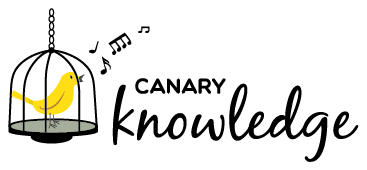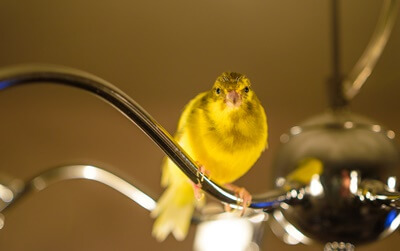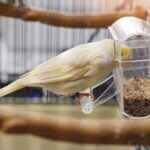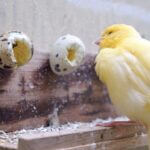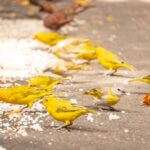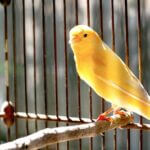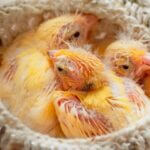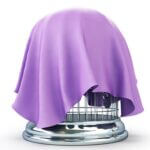Last Updated on: 1st July 2022, 11:42 am
A calcium deficiency can cause health problems in canaries, such as brittle bone syndrome, feather plucking, egg binding, poor cardiac function, and paralysis.
Calcium plays a crucial role in metabolic processes, so ensure that your canary receives enough of this mineral through fresh fruits, eggshells, leafy green vegetables, and cuttlebone.
Aside from these natural foods, you can provide calcium supplements, which are particularly important for female canaries during the breeding season.
What Is Calcium?
Calcium is the most abundant mineral in the body, with 99% of calcium concentration in the bones and skeletal system.
Bones function as a reservoir for calcium, releasing more calcium into the blood when necessary.
According to the International Journal of Research in Pharmaceutical and Biomedical Sciences, calcium is a mineral that most living organisms need because it supports:
- Heartbeat regularity
- Blood clotting
- Nerve impulse
- Cell turgidity
- Metabolic processes
Since birds’ bodies can’t produce calcium, the only way to replenish reserves and prevent hypocalcemia is through a calcium-rich diet or supplementation.
Symptoms of Calcium Deficiency in Canaries
Being deficient in calcium can cause severe disorders, abnormalities, and death if left unresolved. Although the symptoms vary, common signs of a calcium deficiency in canaries are:
- Trembling
- Seizures
- Poor coordination
- Loss of balance
- Soft or cracked eggshells
- Egg binding
- Reproductive issues
- Difficulty flying, climbing, or moving
- Bone fractures
- Rickets or splayed legs
- Feather plucking
Why Do Canaries Need Calcium?
Calcium plays an important role in various metabolic processes, including:
Skeletal Support
Calcium is essential for bone and skeletal formation. Young canaries, in particular, require a calcium-rich diet during their formative years for healthy bone growth and development.
However, even after a canary has matured, it needs ample calcium. Adult canaries experiencing a calcium deficiency have a high risk of skeletal decalcification.
This condition can weaken their bones, thereby making them prone to fractures.
Muscle Function
According to the Biophysics Journal, calcium regulates muscle contractions by binding and reacting with the regulatory proteins (tropomyosin and troponin).
So, canaries with a calcium deficiency experience poor motor coordination and muscle weakness.
Eggshell Formation
Calcium is an essential mineral for breeding canaries and the formation of eggshells.
According to the American Federation of Aviculture, the primary constituent of eggshells is calcium carbonate, which forms approximately 50-90% of the eggshell.
This vital micronutrient determines the eggshell quality, and it combines with other minerals such as magnesium, sodium, nitrogen, and phosphorus to make the eggshell strong and impermeable.
Strong, robust eggshells prevent pathogens from penetrating the eggs, provide calcium to the developing embryo, and stop an incubating canary from crushing its eggs.
Egg Laying
Calcium is an essential mineral for breeding canaries and the formation of eggshells.
According to the American Federation of Aviculture, the primary constituent of eggshells is calcium carbonate, which forms approximately 50-90% of the eggshell.
This vital micronutrient determines the eggshell quality, and it combines with other minerals such as magnesium, sodium, nitrogen, and phosphorus to make the eggshell strong and impermeable.
Strong, robust eggshells prevent pathogens from penetrating the eggs, provide calcium to the developing embryo, and stop your incubating canary from crushing its eggs.
Egg Binding (Dystocia)
Canaries need adequate calcium to prevent egg binding (dystocia).
Dystocia is when a bird can’t lay an egg naturally at a normal rate because of an issue with its reproductive tract or the egg itself.
Calcium deficiency is the primary cause of dystocia, as it often results in malformed or soft-shelled eggs, leading to egg-laying difficulties.
It also causes improper muscular contractions, making it difficult for the bird to release its eggs.
Small birds like canaries are prone to dystocia due to their physical anatomy. They have weaker oviduct muscles that increase the likelihood of egg retention.
Neurological Function
Calcium is critical for proper brain function in canaries because it stimulates the neurons. This enhances neural communication between nerves, muscles, and different parts of the brain.
Do Calcium Requirements Change with Age and Development?
The calcium a canary requires is age, weight, sex, reproductive phase, and health-dependent.
Adult canaries have greater calcium requirements and can cope with higher intakes than chicks and younger canaries. As the chick develops, its calcium requirements grow as it requires more nutrients to help with bone and muscle development.
Canaries can become egg-bound, so breeding female canaries require more calcium for egg-laying purposes. Low calcium leads to weak and malformed eggs that become lodged.
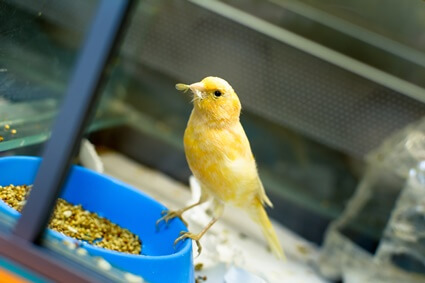
Good Sources of Calcium for Canaries
Canaries can’t naturally synthesize calcium, so consuming calcium-rich foods is the only way to replenish this mineral.
A lack of calcium in a canary’s diet can cause hypocalcemia. Unfortunately, when this happens, your canary will decalcify its bones to compensate.
The best sources of calcium include:
Leafy Greens
Vegetables to include in a canary’s diet include:
- Parsley
- Kales
- Bok choy
- Collard greens
- Mustard greens
- Dandelion greens
- Rapini
While spinach is also a good source of calcium, it contains high amounts of oxalic acid. Spinach shouldn’t be fed to canaries because oxalic acid limits calcium absorption.
Fruits
Fruits with high calcium content include:
- Apricots
- Figs
- Raisins
- Oranges
- Strawberries
- Pineapples
- Papaya
- Kiwi
Fruit is high in sugar and water, increasing the risk of weight gain and diarrhea. The over-consumption of fruit should be avoided, but the occasional piece of fruit is beneficial.
Eggshells
Although eggs are highly nutritious for canaries in their entirety, the eggshells are a particularly good source of calcium.
Even in the wild, calcium-deficient female birds will eagerly feed on eggshells from earlier-nesting birds to replace this essential nutrient.
Calcium carbonate makes up 50-90% of an eggshell’s total weight, explaining why crushed or ground eggshells should be included in your canary’s diet.
Beans
Examples of beans that are rich in calcium include:
- Black beans
- Kidney beans
- Pinto beans
- Soybeans
Raw beans are mildly toxic and can cause gastric problems in birds.
Likewise, uncooked beans contain enzyme inhibitors, which can reduce the capacity of your canary’s body to absorb and utilize certain nutrients, resulting in nutritional imbalances.
Cuttlebone
A cuttlebone is the mineral-rich internal shell of a cuttlefish, hence its name. It comprises 90% crystallized calcium carbonate, making it the ideal dietary supplement for birds.
Even though cuttlebones are available in large sizes up to 10 inches long, always opt for small to medium size cuttlebones not exceeding 4 inches long.
Alternatively, you can use a mortar and pestle to crush the cuttlebone into powder and sprinkle it on top of your canary’s food to control its intake.
Cuttlebones also help with exercise, grooming, beak-trimming, and general enrichment.
Calcium Supplements
If it’s the breeding season or your canary has a calcium deficiency, add calcium supplements to its diet to boost calcium levels and aid recovery.
Calcium supplements are fortified with vitamins and minerals, such as magnesium and Vitamin D3.
Calcium supplements are available in powder form, making them easier to administer. You can put calcium powder on food or dissolve it in drinking water.
Is Too Much Calcium Bad for Canaries?
As much as calcium is an essential nutrient, too much could be detrimental to your canary’s health.
Excess calcium can cause a mineral imbalance and lead to kidney problems and mineralization, issues that are most common in young, growing canaries.
